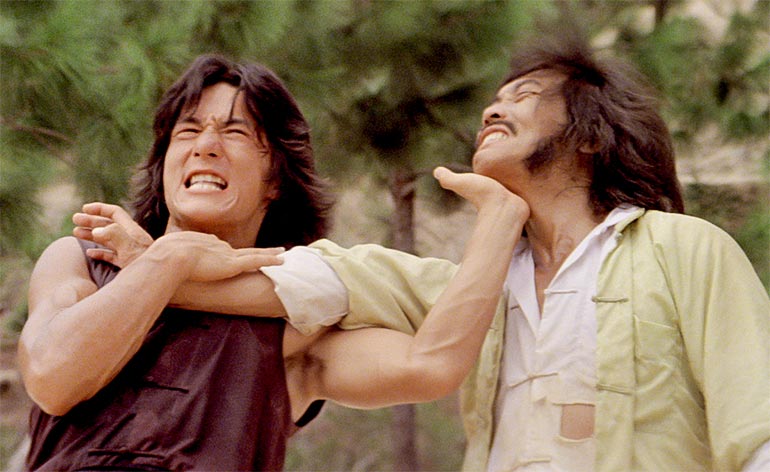THE DRUNKEN MASTER — WHEN CHAOS BECOMES ART
- VanHoanh
- November 9, 2025

There are films that entertain, and there are films that awaken something ancient in the soul. The Drunken Master is the latter — a whirlwind of rhythm, rebellion, and raw human spirit, disguised as a kung fu comedy. Beneath its chaotic laughter lies an ode to imperfection, a celebration of the human body’s freedom when it stops trying to be perfect.
From the very first frame, you feel the pulse of Hong Kong cinema’s golden age — rough, vibrant, unfiltered. The camera dances around a young Jackie Chan, whose movements blend grace with disorder. His fists sway like poetry written in slurred ink. Every strike, every stumble, carries a mischievous energy — a living contradiction that defines the film’s essence.
Wong Fei-Hung, the reckless son turned reluctant hero, is not your typical martial artist. He doesn’t meditate under waterfalls or whisper to the wind. He gets drunk, gets beaten, and then — miraculously — learns to flow with the world’s chaos instead of resisting it. The “drunken boxing” becomes more than a fighting style; it’s a philosophy. It says: let go, and you might find power where you least expect it.
In The Drunken Master, comedy and combat coexist like wine and fire. The humor disarms you, the violence humbles you. The line between genius and foolishness blurs until you realize they might be the same thing. Jackie Chan’s performance is not just physical mastery — it’s an exploration of identity, humility, and creative defiance.

The film’s energy feels improvised, yet every movement is meticulously crafted. It’s a paradox that mirrors life itself — the harder you try to control it, the more it slips away. But when you surrender, when you let the body and spirit merge in rhythm, something miraculous happens: chaos turns into beauty.
Each brawl is a story, each fall a lesson. When Wong Fei-Hung stumbles through the marketplace or faces down his brutal opponents, you don’t just watch a fight — you witness the evolution of a soul. His drunkenness becomes divine. The laughter of the crowd masks an ancient truth: that art is born from surrender, not discipline.
The film’s choreography — raw, unpredictable, alive — redefined martial arts cinema forever. It taught the world that power could be playful, that vulnerability could be strength. It turned the kung fu genre from solemn ritual into joyful rebellion. In that sense, The Drunken Master didn’t just entertain millions; it liberated them.

Jackie Chan’s fearless devotion to physical storytelling transformed pain into poetry. Every bruise, every tumble, every mad grin is a line in a grand epic of endurance. His art is not about domination, but balance — between chaos and control, between laughter and pain, between discipline and freedom.
By the time the final fight erupts — with sweat, dust, and pure kinetic electricity — you realize The Drunken Master is not just a movie. It’s a mirror. It reflects the human condition: fragile, foolish, magnificent. It reminds us that maybe we all stumble toward greatness, one unsteady step at a time.
In the end, what lingers is not the fists or the acrobatics, but the spirit. That wild, untamable spark that says: even when life spins out of control, there’s art in the falling. There’s mastery in the madness. And sometimes, the only way to find balance — is to lose it completely.
Related movies:











